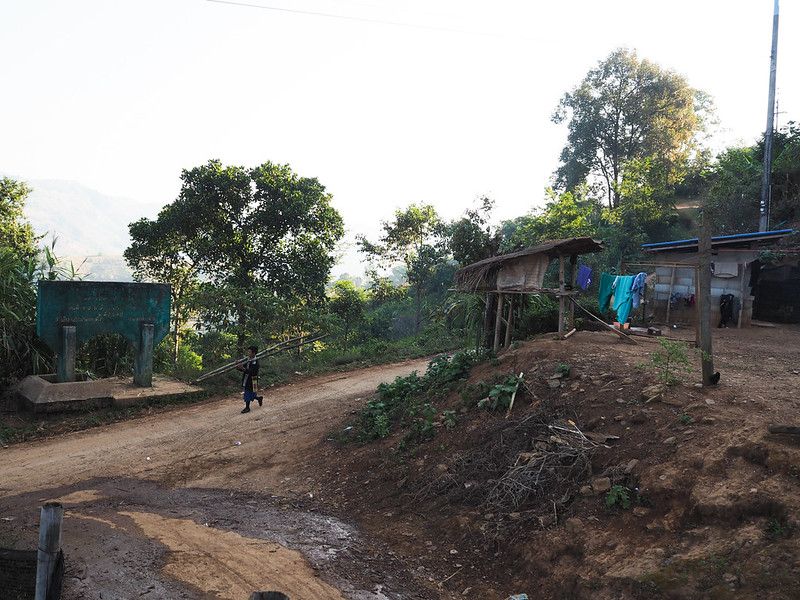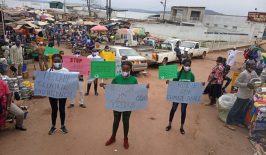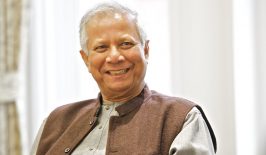Climate change, power imbalances and social inequality are fundamentally connected. But that doesn’t mean we can sit around and wait for the people in power to protect the planet. That’s what Nanticha “Lynn” Ocharoenchai believes – a Thai activist who is raising public awareness about environmental protection and demanding more social equality in a country that is increasingly under threat from the impact of climate change.
Not only are people in the Global South often among the most vulnerable to rising global temperatures, but they are also climate activists, educators and changemakers – fighting for a better world, innovating and inspiring others to tackle the issues that we as a planet face. In this series of interviews with environmental activists from Latin America, Africa and Asia, we want to do our bit to decolonise the conversation around climate change and lift up the underrepresented voices within the climate movement. Find all of the interviews in this Voices of Climate Justice series right here.
The 2017 Global Climate Risk Index ranked Thailand among the top 10 countries in the world most affected by climate change. Its capital Bangkok, built on the flood-plains of the Chao Phraya River, is predicted to be among the urban areas hit hardest in the future, in particular due to extreme rainfall and rising water levels. The very survival of the Thai capital is at stake as temperatures continue to rise each year.
In Interview #3 in our Voices of Climate Justice series, we talk to Nanticha “Lynn” Ocharoenchai, founder of Climate Strike Thailand, a movement which is inspired by Greta Thunberg’s Fridays for Future school strikes. She has made it her mission to raise awareness among the Thai public about the dangers of climate change, demand action from those in power, but also stimulate and encourage behaviour change among every member of society. We talk to her about how people’s well-being is key to protecting the well-being of nature, the impact of the coronavirus on Bangkok and our mentalities, and the need for more empathy in society.
Lynn, when did you first get interested in the topic of climate change? And when did you get involved in the strikes?
I think I learned about it through a combination of learning environmental science in school and consuming the news, gradually educating myself about it over the years. I don’t think I realised so much about the specific impacts in Thailand until I started taking part in the climate strikes and began studying the topic more deeply for myself.
I organised the first strike in March 2019, after reading an article about Greta Thunberg’s life. I read about how she got depressed but still kept fighting, and I felt I could really relate to that. So that got me fired up and I spontaneously set up the climate strike online that same day. Eventually the movement grew and it has been getting more and more attention ever since.
So your first-ever climate strike was online? How else has digital media shaped your activist journey?
The first time I held a strike, I was able to mobilise people by creating a Facebook event. It’s only been through social media that I’ve been able to maintain my group of followers and to grow an audience, and therefore, the movement itself. The internet, and social media, is where I share news, updates and announcements. It’s what I use to connect with followers and network with other environmentalists. My main focus is on creating awareness, rather than working on the frontlines – and I greatly respect the activists who do that – and much of that has only been possible because of digital media.
Your movement in Thailand has been growing, and so has environmental activism around the world. But while the protests have been growing, there’s been very little action on behalf of the people in power. How do you feel about that?
I think climate change, like many persisting social issues, is difficult to solve, especially difficult in fact because it requires so much cooperation between different countries and sectors. And of course, negotiations are extremely hard if everyone only has their own interests at heart and no one is willing to lose. With climate change more so than other issues, I think it requires action from everyone at the same time, otherwise very little progress can be made. And since no big players are willing to take the first step, the small changemakers lose hope and momentum, and more polluters think it’s fine to get away with what they’re doing and they’re not held accountable for their actions. Those who want change have very little power to effectively and quickly revolutionise the system, and those who do have that power just decide not to do it.
How has the coronavirus affected the situation for you in Thailand?
The coronavirus has taken away all media attention from the climate strikes. The surge of panic around this new and immediate threat has also taken people’s minds away from threats from climate change, even though the pandemic is directly linked with natural destruction and the wildlife trade – the encroachment of humans into the natural world. Things like this is what happens when we continue to destroy nature.
But seeing the efforts that have been taken to prevent the further spread of the virus – though clearly, some countries’ have been more effective than others – it’s amazing how humans are able to cooperate with immediacy in reaction to a crisis. We’ve seen governments act to mobilise resources and enforce strict laws in a short amount of time. Because of this sudden disruption, governments and the media are finally beginning to address how deforestation and the wildlife trade is linked to the outbreak.
There’s never been a better opportunity to highlight both the country’s environmental and social issues. When the roads of Bangkok became (somewhat) empty of cars, air pollution dropped dramatically. That’s just one example that showed not only that we are able to reduce our dependence on personal cars should we decide to, but also that we need to, for the health of people living in cities and the environment. Now there’s finally room to promote more inclusive pedestrian spaces and encourage shared modes of transportation, which will both ease traffic congestion and improve living standards. What’s happening right now is a reminder that we humans cause ourselves problems by messing with nature, but also that when we come together and cooperate, we have the ingenuity to turn around a crisis.
What are the key messages behind your own protest right now?
We demand climate justice—which means not only addressing the environmental destruction that contributes to climate change – but also issues in our social structures which drive the exploitation of natural resources. We want change in the way our industries and cities operate, but in a way that’s equitable to all of the people who live in those affected communities.
Currently, those who pollute most are least affected by the impacts of climate change, while the smallest polluters are most vulnerable to them. We need governments to acknowledge that, for corporations to change their practices, and for the public to demand that change from them.
We cannot solve environmental issues without addressing their root cause, which often stems from social inequalities like poverty and the income gap, abuse of indigenous or women’s rights, lack of education and much more. Only when we can ensure people’s well-being, can we ensure that people want to protect the well-being of nature.
What do you hope the climate strikes will achieve?
I hope the Global Strike for Climate will take up enough of the world’s attention whether through civil disobedience, media space, education or anything that will get everyone to realise the urgency of our climate crisis. I hope our coming together demonstrates just how serious this issue is to our entire human civilisation, enough to be more important than any political drama, the stock market or celebrity gossip. This is our survival and our future, and I hope every human being comes to understand that before it’s too late – which it almost is.
Is there anything else you’d like our readers to know?
Everyone regardless of their profession or industry is a part of the problem, but they can also be part of the solution. We need to get creative with how we can help solve the issue, rather than just complaining about it. We can’t wait for governments and corporations to act, because often they’re waiting for us to do the same.
While climate strikes emphasise the need for governments and corporations to change, it is just as much our fault and responsibility as consumers to stop creating demand for the very things that we protest against. It’s shameful to see climate strikers who still enjoy barbecue buffets and fly everywhere, using the need for systemic change as a way to get away with their individual habits. Even if it’s a tiny speck of change which doesn’t feel significant, at least you should be doing your best to show other people that it’s possible to live sustainably if we try hard enough.
Lastly, I think all of this big mess has its roots in our decreasing sense of empathy. As simple as it may sound, I think if we just treated each other the way we wanted to be treated, if we were a little less selfish and treated our shared resources with consideration to other people’s needs, it’d probably be much easier to create a society that wants the best for everyone’s well-being, homes and nature.
You can join Climate Strike Thailand’s thousands of followers on Facebook, Twitter and Instagram. Alongside her activism, Lynn is an environmental writer, storyteller and communications consultant for WWF. You can find more of her writing here and here.
Co-authored by Marisa Pettit and Jan Wisniewski








